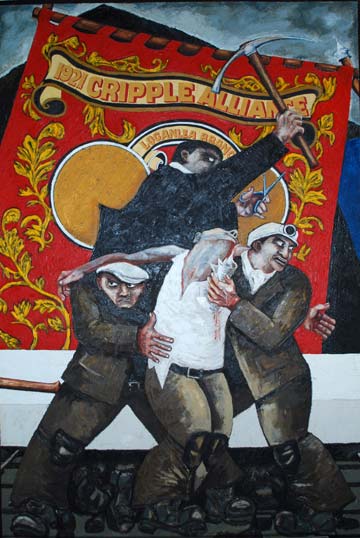The Pits and the Pendulums - Coal Miners Versus Free Markets exhibition at the National Coal Mining Museum
Monday, 1st November 2010
Artist Andrew Turner, who is setting up home in the upper Calder Valley, is staging a remarkable exhibition at the National Coal Mining Museum at Caphouse, between Huddersfield and Wakefield. On Saturday, November 6, the exhibition will be coupled with an afternoon concert by Will Kaufman, from Hebden Bridge.

Not all of Andrew Turner's work sits naturally in a gallery. The exhibition includes two of Britain's most outstanding trades union banners. While it's great to view them here, it's better to see them in action - on a demo. A third banner - the former GMWU Manchester 115 Branch's 'Hulk' won't be on display. The union says that impending cuts dictate it will be needed - on the streets.
Andrew's banners are far removed from the traditional Victorian style with its simple classical or biblical references or the imagery of clasped hands and faces of union leaders.

The banner of North Selby Branch of the National Union of Mineworkers was created after the 84-85 strike. British Coal management banned it from North Selby pit's annual Open Day on the grounds that it was "too provocative."
The banner's powerful imagery interprets the strike, with mounted police pressing a tombstone down on miners who fight to push it back. Central is a pitman lying injured on a stone, but still managing to show two fingers to Margaret Thatcher, the financiers and media barons to his left. The banner evokes memories of the Battle of Orgreave.
Like much of Andrew's work it is allegorical. Here we're shown the role of forces arraigned against the strikers - Government, media, police and capital.

Andrew's work is always figurative and always rooted in collectivism. It's a continual challenge to the individualism and gimmickry of unmade beds and pickled flesh and to recent efforts which seek to spiral art into commodities. Now 70, Andrew was born in West Lothian in Scotland, where his father was a miner. His pit village was Communist and Catholic and his home was the hub of political activity.
As a ten year old he loved to sit beneath the kitchen table sketching and listening to miners talk. Tables feature in much of Andrew's work. They are for negotiation, sometimes for plotting beneath, and sometimes for overturning. His published collection The Generals' Strike - twenty pen drawings which analyse the General Strike - uses the table repeatedly as a device to tell this story, just as depictions of banners or even banner poles are used in his larger paintings and the North Selby banner to tell a tale. Original prints of The Generals Strike collection and Andrew's earlier series The Ballads Moribundus, with its sometimes dark humour, are on show.
For a while Andrew was a trawlerman before winning a place at Edinburgh Art School, from which he was expelled after leading a march on the United States Consulate over the Cuban missile crisis.
He attended Art College in Leeds, then the Royal Academy in London where he was President of the Students' Union.
His diploma piece was the Black Friday triptych, which reflected on the miners' strikes of the 1920s, embracing themes of solidarity, victory, betrayal and defeat, while inferring parallels with the strikes of 1972 and 1974. A prophetic warning, given what came in 1984-85.
South Wales Area of the National Union of Mineworkers bought the work. It has been loaned to the museum for the exhibition, which runs until January 23.
The large centrepieces of the exhibition are Black Friday, the North Selby banner, and another allegorical masterpiece, the banner of Leeds branch of the train drivers' union ASLEF.
The combining of the exhibition with a concert by Will Kaufman should be a perfect match. Will is a regular performer of tributes to the life of Woody Guthrie, on whom he is an acknowledged expert.
Will is from New Jersey and is Professor of English and American Studies at the University of Central Lancashire in Preston. He is also a member of the IWW - the Industrial Workers' of the World, the famed "Wobblies" - yes, they're still going strong.
The concert starts at 2pm. Admission is £2. Depending on demand it may be repeated later in the day. Directions to the National Coal Mining Museum can be found on the museum's website. Admission to the exhibition is free.
See also
The National Coal Mining Museum for England


